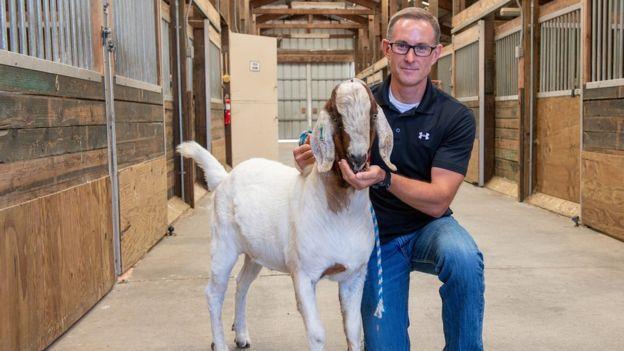
Gene editing to produce 'super dad' livestock
(MENAFN- Colombo Gazette) Scientists have produced gene-edited animals they say could serve as "super dads" or "surrogate sires".
The pigs, goats, cattle and mice make sperm carrying the genetic material of donor animals.
The researchers used a hi-tech gene editing tool to knock out a male fertility gene in animal embryos.
The animals were born sterile, but began producing sperm after an injection of sperm-producing cells from donor animals.
The technique would enable surrogate males to sire offspring carrying the genetic material of valuable elite animals such as prize bulls, said a US-UK team.
This would be a step towards genetically enhancing livestock to improve food production, they added.
Prof Jon Oatley, of Washington State University's College of Veterinary Medicine, said: "This can have a major impact on addressing food insecurity around the world. If we can tackle this genetically, then that means less water, less feed and fewer antibiotics we have to put into the animals."
The surrogate sires were confirmed to have active donor sperm. And the mice fathered healthy offspring that carried the genes of the sperm donor.
The larger animals have not yet been bred. But Prof Bruce Whitelaw of the Roslin Institute at the University of Edinburgh said the study provided a powerful proof of concept.
"This shows the world that this technology is real. It can be used," he said. "We now have to go in and work out how best to use it productively to help feed our growing population."
According to the researchers, the technology could also help in the conservation of endangered species.
It might be possible, for example, to use the frozen sperm of an endangered rhino to regenerate the species. But they said the speed at which the science could be put into action will be influenced by policymakers.
Gene-edited livestock have yet to be granted approval for human consumption, with concerns over product safety, ethics, and animal welfare.
Gene editing involves deleting or changing coding in embryos. One example of current technology is CRISPR, a biological system for altering DNA discovered in 2012.
CRISPR scans the genome looking for the location of a certain gene and then uses "molecular scissors" to snip through the DNA.
While effective in the lab, the process is less than perfect and can cut out too much DNA. These unwanted edits could alter other important genes. (Courtesy BBC)

Legal Disclaimer:
MENAFN provides the
information “as is” without warranty of any kind. We do not accept
any responsibility or liability for the accuracy, content, images,
videos, licenses, completeness, legality, or reliability of the information
contained in this article. If you have any complaints or copyright
issues related to this article, kindly contact the provider above.


















Comments
No comment